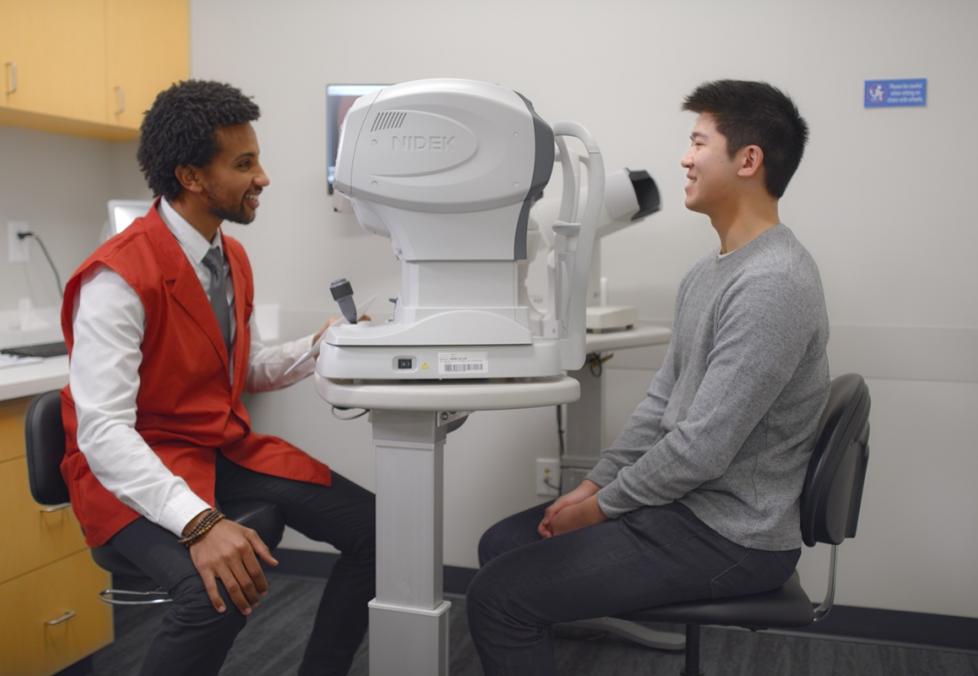
Now’s the perfect time to book an eye exam, shop for new glasses, or stock up on contact lenses.
Everything you need to know to take care of your eyes — for life.
Your optometrist isn’t being nosy when they ask you to complete a medical history form. Here’s what they’re looking for — and why.

The connection between your eyes and the rest of your body isn’t always obvious — but it’s real. Certain health conditions and even your family history can give insight into eye symptoms. So it pays to take the time to fill out your health forms completely and thoroughly before you head in for your eye exam.
“There’s any number of ways that eyes are connected to the body, so when someone presents with symptoms, I have to be a detective and figure it out,” says Mark Ventocilla, O.D., an optometrist with National Vision in Muskegon, Michigan.
If you can clue in your optometrist on your personal and family health history, they may be able to pinpoint potential issues sooner. And the sooner you can get help, the better your eyes and overall health.
Here are the main points your optometrist needs to know.
Has it been a while since your last eye checkup? Now’s the time to book an appointment!
This common chronic condition can take a toll on your eye health. If you have diabetes, your optometrist will be on the lookout for early, often very subtle signs of changes to your blood vessels, tissues and retina. They may also recommend that you get your eyes checked more frequently.
One of the most significant complications associated with diabetes is diabetic retinopathy. This eye disease can cause vision loss and blindness in people with poorly managed diabetes. “It’s the leading cause of blindness for people in America,” Dr. Ventocilla says.
The early stages of diabetic retinopathy usually don’t have any symptoms, but your optometrist can check for it during a dilated eye exam including retinal imaging. Finding it early — with the help of your optometrist — enables you to take the steps needed to protect your vision. That’s why it’s essential to bring your optometrist onto your diabetes care team, he adds.

Now’s the perfect time to book an eye exam, shop for new glasses, or stock up on contact lenses.
A number of eye conditions can gradually lead to vision loss. They’re known as degenerative eye conditions, and many have strong genetic ties, says Dr. Ventocilla. These include:
If any members of your immediate family have glaucoma, for example, your risk of getting it increases fourfold to ninefold, according to the Glaucoma Research Foundation (GRF). But you often won’t have any warning signs that trouble is brewing. That’s because glaucoma in its early stages often has no symptoms, says Dr. Ventocilla. In fact, the GRF estimates that half of those affected may not know they have it.
Similar statistics can be found for other degenerative eye problems. “So be sure to note on your health intake forms if you have a family history of glaucoma or any other eye disease,” he says.
Early detection is vital to slowing progression and preventing complete vision loss, he adds.
Let your optometrist know if you have an autoimmune disease such as lupus, multiple sclerosis (MS), rheumatoid arthritis, Sjögren’s syndrome, or HIV/AIDS.
Sometimes people with autoimmune disorders can develop swelling and inflammation in the center of the eyes. “Over time, that swelling and inflammation can actually destroy eye tissue,” Dr. Ventocilla explains.
In turn, that may result in an uncommon but serious eye disease called uveitis. This disease can cause permanent vision loss, which makes early diagnosis and treatment critical, according to a report from the Mayo Clinic.
Just as with diabetes, when your optometrist is aware you have an autoimmune disease, they will specifically look for signs of uveitis and other potential complications. They’ll also want to make notes to monitor you for any changes.
High blood pressure doesn’t just harm your heart — it also impacts the health of your eyes. If you’ve been diagnosed with high blood pressure, your optometrist will want to know about your treatment plan and your recent blood pressure readings.
They’ll also look for signs of damage caused by high blood pressure that’s left unchecked. Leaking or stiff blood vessels in the retina can signal hypertensive retinopathy, a type of retinal vascular damage that can cause vision loss.
If you’re having a hard time managing your blood pressure, your optometrist may be able to see it in your eyes. But it always helps to give your doctor the heads-up on your health forms. If your optometrist knows you have high blood pressure, they can help keep tabs on how you’re managing your condition and offer advice to get you back on track.
After all, eye troubles aren’t the only issue caused by hypertension. For example, a 2021 study reveals that patients with mild hypertensive retinopathy have a “significant” risk of stroke compared to people without the eye disease.
The takeaway, according to Dr. Ventocilla, is that those medical forms are more than extra paperwork. They’re valuable pieces of information that help your optometrist give you the best care possible.